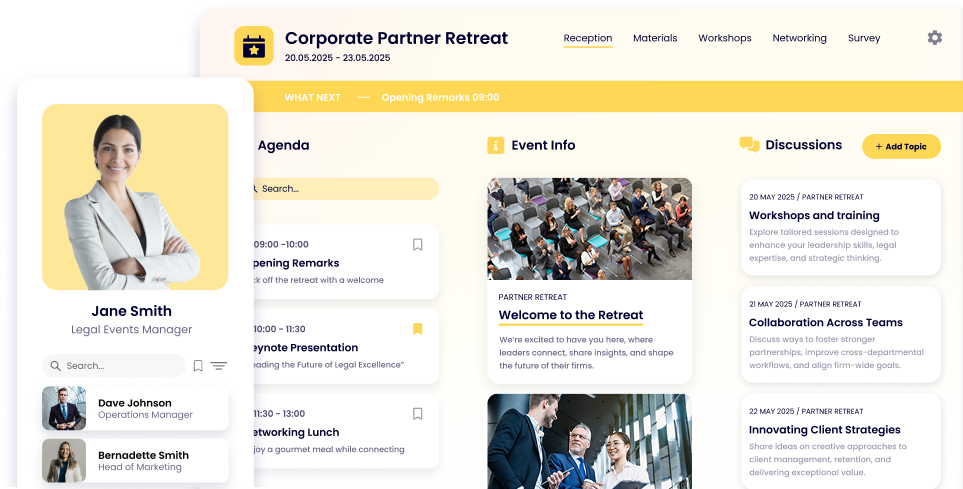A Detailed Guide to Successful Conference Management

Lisa Broom | Head of Marketing

Conferences are a major part of any company’s calendar — the perfect chance to build your team, increase understanding, boost morale, and generate interest in new ventures. But knowing hot to manage a conference event is not so easy. It requires meticulous planning, coordination, and execution to be effective.
But don’t worry. That’s why we created this guide: to provide the essential steps for seamless conference event management. That means your event will run smoothly and achieve its goals.
Key Takeaways
- Understanding the different types of conferences
- Effective planning and budgeting strategies
- Utilizing conference and event management software
- Key stages in conference management
- Leveraging technology for improved attendee experience
What is a Conference?
A conference is a formal gathering of individuals sharing a common interest, typically focused on a specific subject or industry. Conferences can range from small, specialized seminars to large, international conventions.
Types of Conferences
Seminar
- Focused on specific topics
- Usually involves a single speaker or a small group
- Interactive Q&A sessions
Seminars are focused gatherings centered around specific topics or themes. Typically, they involve a single speaker or a small group of experts who present their knowledge and insights to the attendees.
Seminars often include interactive Q&A sessions, allowing participants to engage directly with the speakers, ask questions, and discuss the presented material in more depth. These events are usually shorter in duration, making them ideal for intensive learning on a particular subject.
Workshop
- Hands-on learning experience
- In-depth coverage of specific skills or techniques
- Smaller groups for better interaction
Workshops provide a hands-on learning experience where participants actively engage in practical activities. These sessions offer in-depth coverage of specific skills or techniques, enabling attendees to gain valuable expertise through direct practice.
Workshops are conducted in smaller groups to foster better interaction and personalized instruction. They are highly interactive, often involving exercises, group work, and real-time feedback, making them ideal for skill development and applied learning.
Roundtable
- Discussion-focused
- Equal participation from all attendees
- Ideal for brainstorming and problem-solving
Roundtables are discussion-focused events that emphasize equal participation from all attendees. Unlike traditional conferences where speakers lead the sessions, roundtables encourage open dialogue and exchange of ideas among participants.
They are ideal for brainstorming and problem-solving, as they create a collaborative environment where everyone’s input is valued. Roundtables are often used for strategic planning, policy discussions, and in-depth analysis of complex issues.
Symposium
- Academic or professional presentations
- Multiple speakers or panelists
- Formal and structured
Symposiums are formal and structured gatherings featuring academic or professional presentations. These events typically involve multiple speakers or panelists who present their research, findings, or viewpoints on a specific topic.
Symposiums are designed to provide a comprehensive overview of the subject matter, with each presentation contributing to the overall theme. They often include question-and-answer sessions and discussions, allowing for scholarly exchange and debate. Symposiums are common in academic, scientific, and professional fields.
Virtual Conference
- Held online via digital platforms
- Accessible from anywhere in the world
- Features like real-time chat, personalized profiles, and interactive forums enhance attendee engagement
Virtual conferences are held entirely online using digital platforms, making them accessible to participants from anywhere in the world. These conferences leverage technology to provide a rich and interactive experience. Fliplet’s event networking app offers features like real-time chat, personalized profiles, and interactive forums enhance attendee engagement and networking opportunities.
Virtual conferences can include live-streamed presentations, virtual exhibitor booths, and online workshops, offering a flexible and cost-effective alternative to in-person events.
Webinars
- Online seminars
- Facilitates seamless presentations and audience interaction
Webinars are online seminars that facilitate seamless presentations and audience interaction. They are typically conducted live, allowing for real-time engagement between the presenter and attendees. Webinars often include features such as slide presentations, video streaming, and interactive Q&A sessions.
They are an effective way to reach a broad audience, disseminate information, and provide educational content. Webinars are widely used for professional development, training, and marketing purposes.
Using a webinar app, you can create online events easily, with seamless presentations that include audience interaction.
Conference vs. Events vs. Conventions
Understanding the differences between conferences, events, and conventions is crucial for effective planning and management. Each type of gathering serves distinct purposes and requires specific considerations.
Conferences
Conferences are focused gatherings that center around specific themes or industries. They are designed to provide educational and networking opportunities for attendees. Conferences typically include a series of presentations, workshops, and panel discussions led by experts in the field. Attendees are often professionals seeking to gain knowledge, share insights, and build connections within their industry. Key elements of conferences include:
- Educational Content: In-depth sessions on specific topics.
- Networking Opportunities: Facilitated through structured activities and informal interactions.
- Industry Focus: Tailored to professionals within a particular field or sector.
Events
The term “events” is a broad category that encompasses any organized gathering of people. Events can vary significantly in size, purpose, and format. They can be social, cultural, corporate, or recreational in nature. Examples include weddings, festivals, corporate meetings, and charity fundraisers. Due to their wide-ranging nature, events require versatile planning and can include a mix of the following:
- Social Gatherings: Celebrations like weddings, birthdays, and anniversaries.
- Corporate Events: Business meetings, product launches, and corporate retreats.
- Cultural Events: Festivals, concerts, and art exhibitions.
- Recreational Events: Sports tournaments, community fairs, and recreational activities.
Conventions
Conventions are large-scale events that often involve exhibitions, and a diverse range of activities. They typically attract a broad audience, including industry professionals, enthusiasts, and the general public. Conventions are usually held annually and can span several days. They are characterized by:
- Exhibitions: Large display areas for companies to showcase products and services.
- Multiple Sessions: Simultaneous presentations, workshops, and panels.
- Wide Audience: Attracts attendees from various backgrounds and interests.
By understanding the unique characteristics of conferences, events, and conventions, organizers can tailor their planning strategies to meet the specific needs of each type of gathering. This ensures a well-organized, successful event that meets the goals and expectations of both organizers and attendees.
Key Factors for Choosing a Conference Venue
Regardless of the type of gathering, selecting the right venue is critical to the event’s success.
When choosing a venue for an event, event managers consider several key factors to ensure the event’s success. On Quora, users highlight:
- Location: Accessibility for attendees, proximity to transportation hubs, and local amenities.
- Capacity: Ensuring the venue can accommodate the expected number of attendees comfortably.
- Cost: Aligning with the budget while considering hidden fees.
- Amenities and Services: Availability of necessary facilities like AV equipment, catering, and Wi-Fi.
- Ambiance: Suitability of the venue’s atmosphere and aesthetics for the event.
- Flexibility: Ability to customize the space to meet event needs.
- Reputation: Venue’s track record and reviews from previous events.
These factors help in selecting a venue that enhances the attendee experience and meets logistical requirements.
Necessity for Conference Management

So, we understand what conferences are, but what exactly is conference and event management?
Conference and event management encompasses the planning, organization, and execution of conferences, meetings, seminars, and other events.
This involves a comprehensive process that includes setting objectives, budgeting, selecting venues, managing registrations, coordinating logistics, and ensuring effective communication among stakeholders. If you need to know how to take over a conference event management, you’ll need to be ready to take on these responsibilities.
The goal is to create a seamless experience for attendees, speakers, and organizers. Key elements include:
- Planning: Establishing goals, themes, and timelines.
- Coordination: Handling logistics, such as venue selection, transportation, and accommodations.
- Execution: Managing on-site activities and troubleshooting issues.
- Evaluation: Collecting feedback and assessing the event’s success.
Conference and event management aims to deliver organized, efficient, and memorable events that meet or exceed the objectives set by organizers and stakeholders.
Types of Conference Management

In-house Processes
- Managed internally by the organization
- Full control over every aspect
Joint Partnerships
- Collaboration with external partners
- Shared responsibilities and resources
Third-party Organizers
- Outsourcing to professional event management companies
- Expertise and experience in handling all event aspects
Conference Management Process

For event management conferences require a lot of planning, and they work best if you have a process in place. Sometimes, it can feel like spinning plates. But if you go step-by-step, you’ll be sure not to leave any detail overlooked.
Having a process gives you this peace of mind, but it also allows you to improve conferences in the long term. If issues arise during the conference, it’s easy to track down where things went wrong. You can simply trace it back in your process, tweaking it for the next time around.
So, putting the right conference management system in place makes all the difference.
Below, we break conference event management into six easy-to-follow stages.
Stage #1 – What are your objectives for the conference?
- Define clear goals and objectives: Establish the primary purpose of the conference, whether it’s educational, networking, or promotional.
- Identify target audience and key outcomes: Determine who the event is for and what you hope to achieve, such as attendee engagement, knowledge dissemination, or business opportunities.
Stage #2 – Finalizing the budget
- Outline all potential expenses: Include venue costs, speaker fees, marketing, catering, and technology.
- Allocate funds for each aspect of the event: Ensure the budget covers all necessary expenses without exceeding financial limits.
Stage #3 – Setting up operations
- Establish a timeline and assign tasks: Create a detailed schedule and delegate responsibilities to team members.
- Coordinate logistics, such as venue, transportation, and accommodations: Arrange for venue, transportation, accommodations, and other essential services.
Stage #4 – Shortlisting speakers
- Identify and invite keynote speakers and panelists: Choose speakers who align with the conference’s theme and objectives.
- Confirm their availability and requirements: Ensure speakers are available and meet their logistical and technical needs.
Stage #5 – Setting up a website, mobile app, and digital marketing campaigns
- Develop an event website: Provide information and facilitate registration.
- Utilize conference event management software: Manage scheduling, networking, and updates efficiently.
- Promote the event: Use social media and email campaigns to attract attendees. (Need help here? Check out our guide: 30 Best Mobile Event Apps)
Stage #6 – Prepare onsite operations
- Coordinate on-site logistics: Ensure smooth operation on the event day.
- Set up registration desks, signage, and information booths: Facilitate attendee check-in and provide necessary information.
Using Conference Management Software and Apps

Conference management software plays a crucial role in streamlining both planning and execution stages of an event. These platforms offer a variety of features designed to simplify complex tasks and enhance the attendee experience.
Any conference management system you use should be feature-rich and match your needs and budget.
Key Features of Conference Management Software
- Registration Management: Efficiently handle attendee registration, ticketing, and payments. Automated confirmation emails and reminders keep participants informed and engaged.
- Scheduling: Create and manage event schedules with ease. The software allows for real-time updates, ensuring all attendees are aware of session times and locations.
- Attendee Tracking: Monitor attendee participation and engagement throughout the event. This feature helps in understanding attendee behavior and preferences, enabling more personalized experiences.
- Feedback Collection: Gather valuable insights through surveys and feedback forms. Post-event feedback helps in evaluating the event’s success and identifying areas for improvement.
Benefits of Fliplet’s Conference Management App
Fliplet’s app for conferences offers comprehensive solutions to manage all aspects of your event seamlessly. Here’s how Fliplet can enhance your conference management:
- User-Friendly Interface: Intuitive design that makes navigation and usage straightforward for both organizers and attendees.
- Customizable Screens: Adaptable to fit the unique needs of any event, ensuring all specific requirements are met.
- Real-Time Updates with Event Agenda: Instant updates keep everyone informed about changes to the schedule or other important announcements.
- Networking Opportunities with AI features: Features like personalized profiles, real-time chat, and AI networking foster better networking and engagement among attendees.
- Detailed Analytics: Comprehensive reporting tools to measure event performance and attendee satisfaction.
With Fliplet’s robust features and user-friendly platform, managing a conference becomes a streamlined and efficient process, allowing you to focus on delivering a memorable event experience.
Explore more about how Fliplet can transform your conference management here.
Improved Conference Management with Fliplet’s Conference Management App
Fliplet’s conference management platform provides tools for seamless event planning and execution. Features include real-time updates, attendee engagement tools, and detailed analytics. Discover how Fliplet can enhance your conference management experience — book a free meeting with our team right now.
FAQs
What factors should I consider when finalizing the budget for a small conference?
Consider venue costs, speaker fees, marketing expenses, and logistical costs. Allocate funds wisely to ensure all aspects are covered.
How can I efficiently set up operations for a conference?
Establish a detailed timeline, assign tasks to team members, and coordinate logistics such as venue setup, transportation, and accommodations.
How can I leverage technology for conference management?
Use conference management software for registration, scheduling, and attendee engagement. Utilize mobile apps for real-time updates and networking.
How do I ensure smooth onsite operations during the conference?
Prepare in advance, coordinate with on-site staff, and set up information booths and registration desks to assist attendees.
How can I measure the success of my conference?
Collect feedback from attendees, track engagement metrics, and evaluate whether the event met its objectives.
What post-conference activities should I plan for feedback and follow-up?
Send out surveys, share event highlights, and follow up with attendees and speakers to gather feedback and insights.
How do I manage unexpected issues or emergencies during a conference?
Have a contingency plan in place, designate a crisis management team, and communicate effectively with attendees and staff.
What are some tips for maintaining attendee satisfaction throughout the event?
Provide clear information, offer engaging sessions, ensure smooth logistics, and address attendee concerns promptly.
What are the trends in conference management for 2024 and beyond?
Trends include increased use of technology, hybrid events, sustainability practices, and personalized attendee experiences.


![30 Best Mobile Event Apps and Conference Apps [2024]](https://fliplet.com/wp-content/uploads/2023/02/15-Best-Event-Apps_Thumbnail.png)

